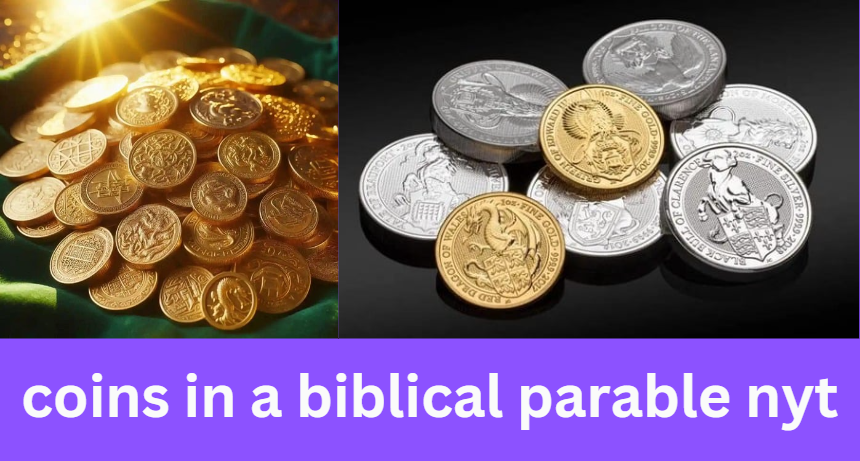When solving crossword puzzles, especially from sources as reputable as The New York Times (NYT), clues can often be both intriguing and challenging. One such clue that has captivated many is “coins in a biblical parable.” This phrase refers to a specific reference within the Bible, and understanding it requires both biblical knowledge and critical thinking.
In this comprehensive guide, we will explore the meaning behind “coins in a biblical parable,” delve into the biblical context, and provide insights and interpretations that go beyond existing online sources. This article is tailored for readers in the USA who are interested in deepening their understanding of biblical references, especially within the context of crossword puzzles.
Contents
- 1 Understanding the Clue: “Coins in a Biblical Parable NYT”
- 2 A Deep Dive into the Parables Involving Coins
- 3 The Broader Context of Coins in Biblical Parables
- 4 Insights and Interpretations Beyond Existing Sources
- 5 Frequently Asked Questions (FAQs)
- 6 Conclusion
Understanding the Clue: “Coins in a Biblical Parable NYT”
The Nature of NYT Crossword Puzzles
The New York Times crossword puzzles are known for their clever wordplay, cultural references, and sometimes cryptic clues. Solvers often encounter clues that require a broad understanding of literature, history, popular culture, and religious texts. The clue “coins in a biblical parable” is an example of how NYT crossword puzzles often draw from religious and historical contexts to challenge solvers.
What Does “Coins in a Biblical Parable” Refer To?
The clue “coins in a biblical parable” likely refers to a specific story from the Bible that involves coins. There are several parables in the New Testament where coins play a significant role, and identifying the correct one is key to solving the puzzle. The most commonly referenced parables involving coins are:
- The Parable of the Talents (Matthew 25:14-30) – This parable describes a master who entrusts his servants with talents (a form of currency) and rewards or punishes them based on how they manage the money.
- The Parable of the Lost Coin (Luke 15:8-10) – In this story, a woman loses one of her ten silver coins and rejoices when she finds it, symbolizing God’s joy over the repentance of a sinner.
- The Parable of the Unjust Steward (Luke 16:1-13) – This parable involves a steward who uses his master’s money (possibly coins) to secure his future after being dismissed.
Given that this is a crossword puzzle clue, the answer could be a word related to any of these parables, such as “talents,” “denarii,” or “drachmas.”
A Deep Dive into the Parables Involving Coins
The Parable of the Talents (Matthew 25:14-30)
Context and Summary
The Parable of the Talents is one of the most well-known teachings of Jesus, found in the Gospel of Matthew. In this parable, a master distributes his wealth among his servants before going on a journey. Each servant receives a different amount of money, referred to as “talents” (a large sum of currency at the time). Upon his return, the master assesses how each servant has managed the money. Those who have invested wisely and increased the amount are rewarded, while the servant who merely hid the money is punished.
Symbolism and Interpretation
The “talents” in this parable are often interpreted as gifts, skills, or resources that God entrusts to individuals. The parable emphasizes the importance of using one’s gifts to serve God and others, rather than letting them go to waste. The coins in this context symbolize responsibility and the expectation of growth and productivity.
Relevance to the Crossword Clue
If the NYT crossword clue “coins in a biblical parable” refers to this parable, the answer might be “talents.” This word not only fits within the biblical context but also aligns with the common usage of the word “talent” to mean a natural aptitude or skill, thus adding a layer of wordplay to the puzzle.
The Parable of the Lost Coin (Luke 15:8-10)
Context and Summary
The Parable of the Lost Coin is a brief but powerful story found in the Gospel of Luke. It is part of a trio of parables, including the Parable of the Lost Sheep and the Parable of the Prodigal Son, that highlight God’s concern for sinners. In this parable, a woman with ten silver coins loses one and searches her house diligently until she finds it. Upon finding the coin, she calls her friends and neighbors to rejoice with her.
Symbolism and Interpretation
The lost coin represents a lost soul, and the woman’s diligent search symbolizes God’s relentless pursuit of those who have strayed. The rejoicing upon finding the coin reflects the joy in heaven over a sinner who repents. The coins in this parable symbolize something precious and valued, emphasizing the worth of every individual in God’s eyes.
Relevance to the Crossword Clue
If the clue refers to this parable, the answer could be “drachmas” or “silver.” These terms relate directly to the coins mentioned in the story. The word “drachma” refers to a Greek silver coin, which aligns with the setting of the New Testament and would be a fitting answer for the crossword puzzle.
The Parable of the Unjust Steward (Luke 16:1-13)
Context and Summary
The Parable of the Unjust Steward, also found in the Gospel of Luke, tells the story of a steward who is accused of wasting his master’s goods. Knowing he will be dismissed, the steward cleverly reduces the debts owed to his master by various debtors, hoping to secure favor with them once he is out of a job. Surprisingly, the master commends the steward for his shrewdness, though the parable ends with a teaching on honesty and the proper use of wealth.
Symbolism and Interpretation
This parable is complex and has been interpreted in various ways. It emphasizes the importance of being prudent and wise in managing resources, even in difficult circumstances. The coins, or money, in this parable symbolize worldly wealth and the moral challenges associated with its use.
Relevance to the Crossword Clue
If the NYT crossword clue alludes to this parable, the answer could be “steward,” “debts,” or “money.” These terms are integral to the story and reflect the central themes of the parable.
The Broader Context of Coins in Biblical Parables
The Role of Money and Coins in Biblical Times
Coins and money played a significant role in the daily lives of people in biblical times. Various forms of currency, such as talents, denarii, and drachmas, were used for trade, paying taxes, and other financial transactions. The use of coins in Jesus’ parables was deliberate, as it provided a relatable and tangible way to convey spiritual truths to his audience.
Symbolic Meanings of Coins in the Bible
In addition to their practical use, coins in the Bible often carry symbolic meanings. They can represent wealth, power, responsibility, and the moral dilemmas associated with material possessions. Jesus’ use of coins in parables highlights these themes and encourages his followers to reflect on their attitudes toward money and material wealth.
Insights and Interpretations Beyond Existing Sources
The Cultural and Historical Significance of Coins in Parables
Understanding the cultural and historical context of the coins mentioned in biblical parables can provide deeper insights into their meanings. For example, the talent was an enormous sum of money, equivalent to several years’ wages for a laborer. This highlights the gravity of the responsibility given to the servants in the Parable of the Talents. Similarly, the drachma in the Parable of the Lost Coin, though a modest amount, was significant to the woman who lost it, reflecting the value God places on each individual.
The Ethical Teachings in Parables Involving Coins
The parables that involve coins are not just stories about money; they are teachings on ethics, stewardship, and the human condition. The Parable of the Talents, for instance, challenges readers to consider how they are using their God-given gifts. Are they investing them wisely, or are they letting fear and complacency hold them back? The Parable of the Lost Coin, on the other hand, speaks to the lengths to which God will go to recover what is lost, offering a message of hope and redemption.
Applying the Lessons of These Parables Today
The lessons from these parables are timeless and can be applied to modern life. In a society that often equates success with wealth, the Parable of the Talents reminds us that true success lies in how we use our resources to serve others and fulfill our purpose. The Parable of the Lost Coin encourages us to value every person, recognizing their inherent worth, and to seek out those who may feel lost or forgotten.
Frequently Asked Questions (FAQs)
What is the answer to the NYT crossword clue “coins in a biblical parable”?
The answer to this crossword clue could vary depending on the specific parable being referenced. Common answers might include “talents” (from the Parable of the Talents), “drachmas” (from the Parable of the Lost Coin), or “denarii” (from other biblical contexts).
How do coins function symbolically in biblical parables?
Coins in biblical parables often symbolize responsibility, value, and the ethical use of resources. They are used to teach lessons about stewardship, the value of individuals, and the moral implications of wealth.
What is the significance of the Parable of the Talents?
The Parable of the Talents teaches about the importance of using one’s gifts and resources wisely. It emphasizes accountability and the expectation that we should make the most of what we have been given, both materially and spiritually.
Why are coins used in parables by Jesus?
Jesus used coins in his parables because they were a familiar and relatable aspect of daily life for his audience. Coins provided a tangible way to illustrate spiritual truths and ethical teachings in a way that his listeners could easily understand.
Can the lessons from these parables be applied today?
Yes, the lessons from these parables are timeless and can be applied to modern life. They encourage us to reflect on our use of resources, the value we place on others, and our ethical responsibilities.
Conclusion
The clue “coins in a biblical parable” from the New York Times crossword puzzle opens a window into the rich, symbolic world of biblical teachings. Understanding the specific parables that involve coins allows us to not only solve the crossword puzzle but also gain deeper insights into the ethical and spiritual lessons these stories convey.
From the Parable of the Talents to the Parable of the Lost Coin, each story offers a unique perspective on responsibility, value, and the human condition. By exploring these parables in detail, we can appreciate the profound wisdom they offer and apply these lessons to our lives today.
Whether you’re a crossword enthusiast or a seeker of biblical knowledge, the exploration of “coins in a biblical parable” is both a rewarding intellectual exercise and a meaningful spiritual journey.



